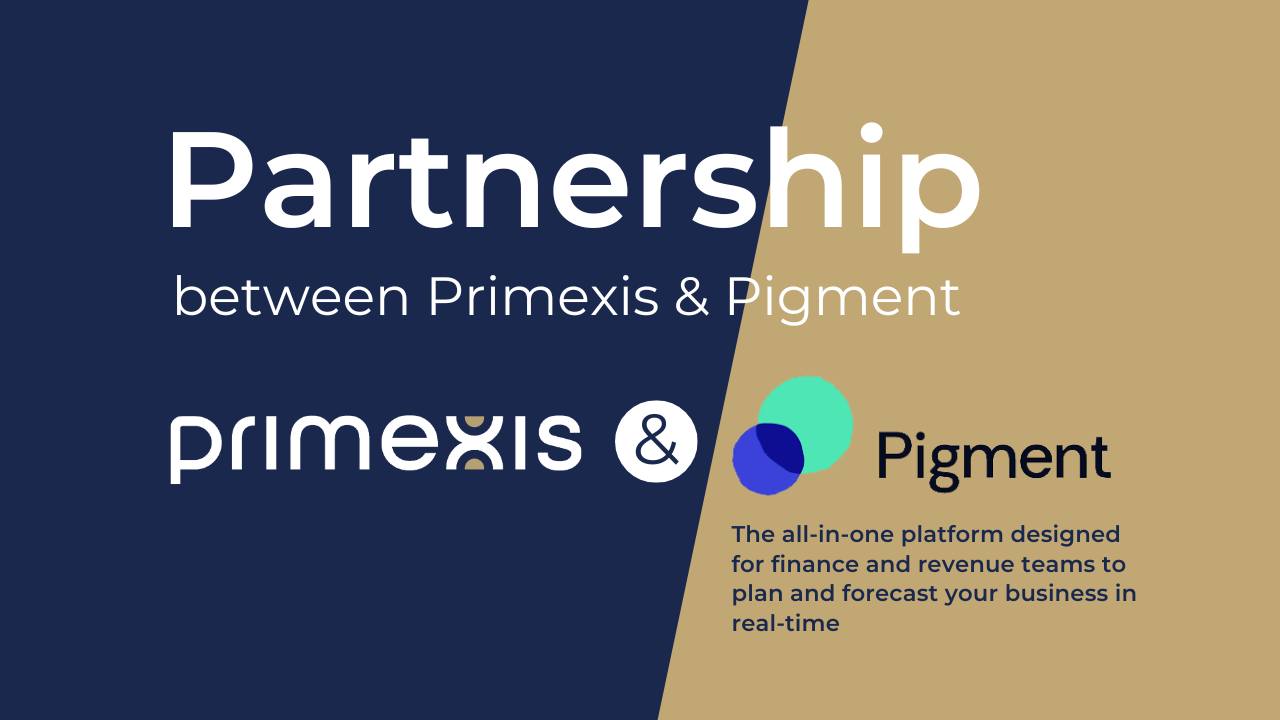France – Tax Alert
Mandatory E-Invoicing & E-Reporting
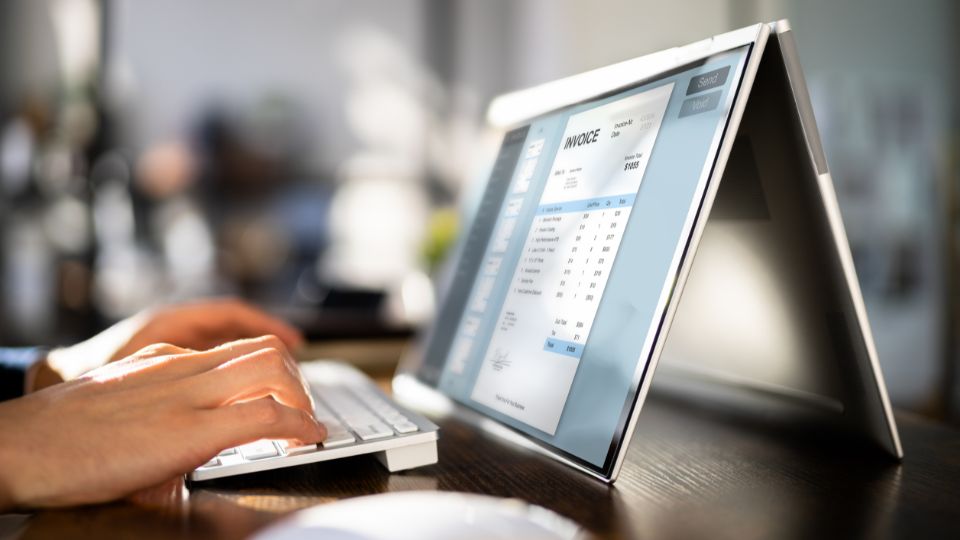

Article written by Alexis Gasto
Partner Primexis / France
France is moving forward with its mandatory e-invoicing and e-reporting reform, set to begin in September 2026. Invoices in Word, Excel, PDF-only, or paper format will no longer be accepted for domestic B2B transactions. Whether your company operates in France or trades with French entities, this reform will impact the way you issue, receive, and report invoices.
Primexis can help you navigate this transition with clarity—from understanding key deadlines and obligations based on your client types, to taking the concrete steps needed to ensure you’re both technically and operationally ready, including PDP selection and compliance support.
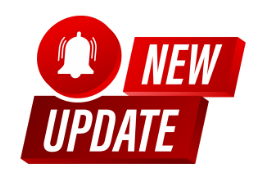
Starting September 2026, traditional invoice formats like Word, Excel, PDF-only, or paper will no longer be compliant for domestic B2B transactions in France
The implementation schedule is now official
With the reform timeline confirmed by the French Parliament, businesses can now plan their transition with greater certainty. Key deadlines vary depending on company size and obligations. Here’s a breakdown of who needs to be ready, and by when.
By September 1, 2026
- – All VAT-registered businesses must be able to receive e-invoices via a Partner Dematerialization Platform (PDP)
- – Large enterprises and mid-cap companies must also issue e-invoices from this date
By September 1, 2027
- – SMEs and microenterprises must begin issuing e-invoices
- – All businesses must comply with e-reporting (B2C, B2B, international, etc.)
Is your business ready for France’s mandatory e-invoicing and e-reporting reform coming in September 2026? This major regulatory shift will affect all companies operating in or doing business with France.
Now is the time to get prepared. Selecting the right tools, mapping out your processes, and adapting internal workflows can take anywhere from 6 to 12 months.
France is entering a new era of digital invoicing
What is E-Invoicing and E-Reporting?
The reform coming into effect in France in September 2026 is built around two key components: E-Invoicing and E-Reporting. Here’s what they mean and how they differ.
E-Invoicing
- – Issuing and receiving structured electronic invoices (Factur-X, UBL, or CII format) between VAT-registered entities in France
- – Involves dual transmission: to the client and to the French tax authorities via PDPs
E-Reporting
- – Reporting data from non-domestic B2B, B2C, or exempt transactions (and payment data for services) directly to the tax administration
Understanding the Partner Dematerialization Platform (PDP)
Only PDPs (Partner Dematerialization Platforms) are authorized to interact directly with the central public platform (PPF) and update the national invoice directory. Certified by the French Tax Authorities, these private platforms enable businesses to:
- – Send and receive electronic invoices in the required formats (Factur-X, UBL, CII)
- – Report invoicing and payment data to the tax administration
- – Manage invoice statuses (e.g., deposited, rejected, paid)
- – Route invoices to the correct recipient via the national directory
Standard Process for French B2B E-Invoicing (VAT-Registered Entities)
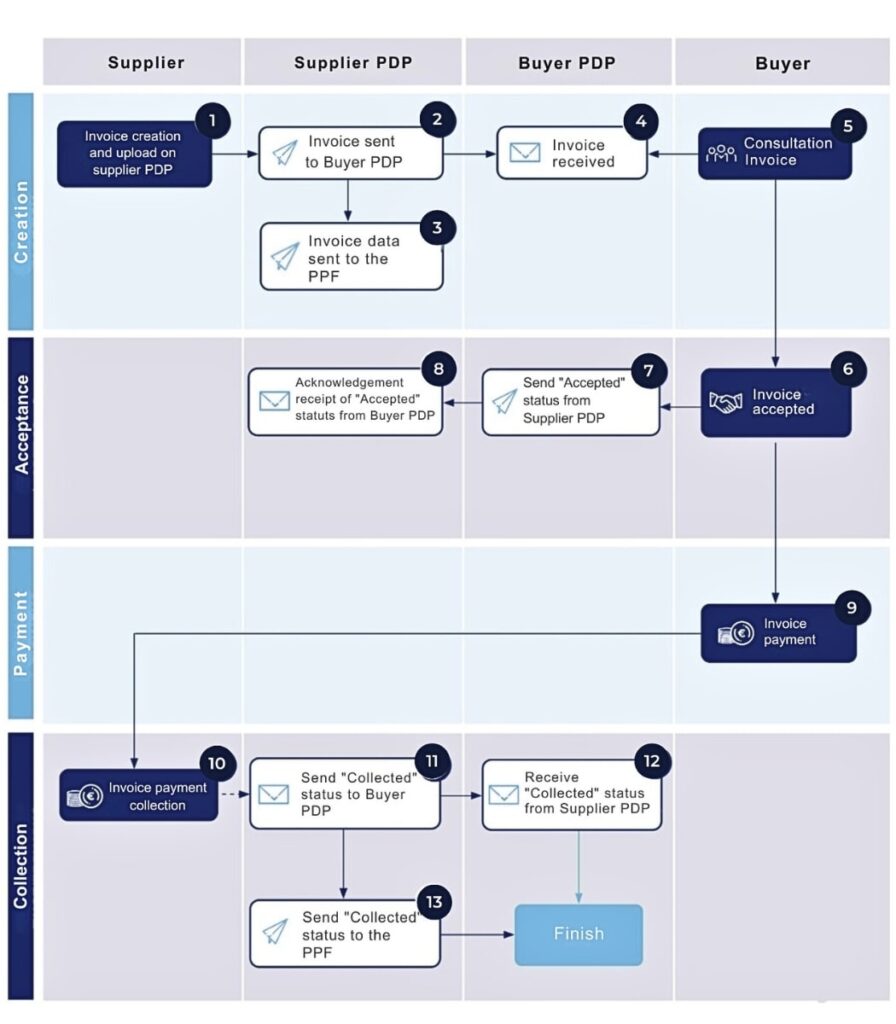
6 Key Preparation Steps
With the reform timeline confirmed, now is the time to take action. To be ready by September 2026, businesses must align their systems, tools, and teams with the new e-invoicing and e-reporting requirements. Here are 6 essential steps to help you get prepared, both technically and operationally.
- 1. Choose a PDP – All businesses must subscribe to a PDP before September 2026 to receive invoices
- 2. Audit your flows – Identify how you handle invoices (sales and purchases), what software is used, and where manual steps remain
- 3. Map your client/supplier base – Segment by transaction type (B2B, B2C, international), VAT status, and tools used
- 4. Ensure tools are compliant – Your invoicing, accounting, and POS tools must support the required formats and API interconnection
- 5. Organize internal roles – Finance teams must manage new processes like lifecycle statuses (deposited, rejected, refused, paid)
- 6. Plan for training and support – Inform and train teams and stakeholders on formats, platforms, and deadlines
What will change?
With the new reform, your invoicing or reporting obligations will depend on the type of client you’re dealing with. Whether your client is a French business, a foreign company, or a public entity, the required process will vary. The table below outlines what you’ll need to do in each case.
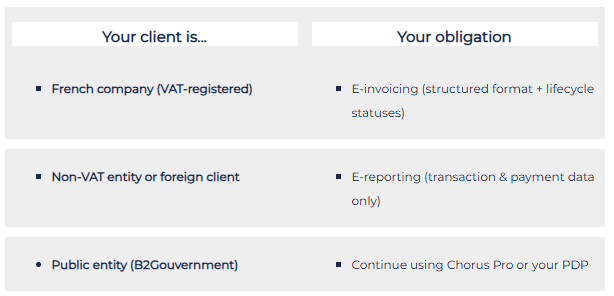
Operational & Financial Risks of Delay
Waiting too long to get ready can lead to real consequences, including the inability to receive supplier invoices, financial penalties, and disruptions to your operations. It also means missing out on the benefits of automation and process optimization.
- – Inability to receive invoices from suppliers from 09/2026
- – Sanctions: up to €15 per missing invoice or €250 per missing data transmission
- – Operational disruption and cashflow issues
- – Missed opportunities to automate and streamline processes
Plan Your Milestones
The transition to mandatory e-invoicing and e-reporting in France is a multi-step journey. Each phase, from tool selection to full compliance, requires preparation and coordination across your teams. Use this timeline to structure your approach and avoid last-minute pressure.
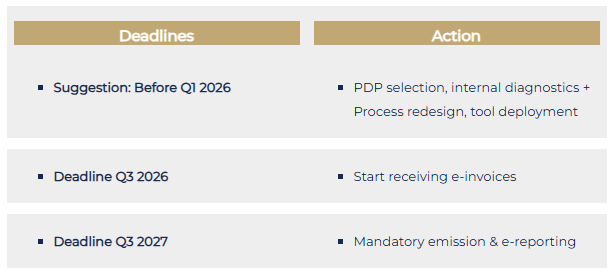
How can Primexis support you through the E-Invoicing Reform?
Navigating the upcoming French e-invoicing and e-reporting obligations can be complex, but you don’t have to go through it alone. At Primexis, we can help you anticipate the challenges, ensure compliance, and optimize your accounting and financial workflows. Whether you fully outsource your operations or handle them internally, our experts are here to guide you every step of the way.
✅ Select the right PDP and tools:
- – If you fully outsource your books to Primexis, we have our own providers solutions to propose
- – If the accounting is done internally or via your SSC, you must contact your software editor ASAP to check the compatibility/operating model with your ERP
✅ Analyze and map your current flows
✅ Ensure technical interoperability with your software
✅ Train your teams and prepare documentation
✅ Provide full-service solutions (invoice creation, archiving, follow-up, compliance)
________________________________________
Need more information or guidance?
Our team remains available to help you better understand the upcoming obligations and assess your current situation.
📩 You can reach us at contact@primexis.fr
We would be happy to assist you. Contact us today to schedule your personalized roadmap session.

